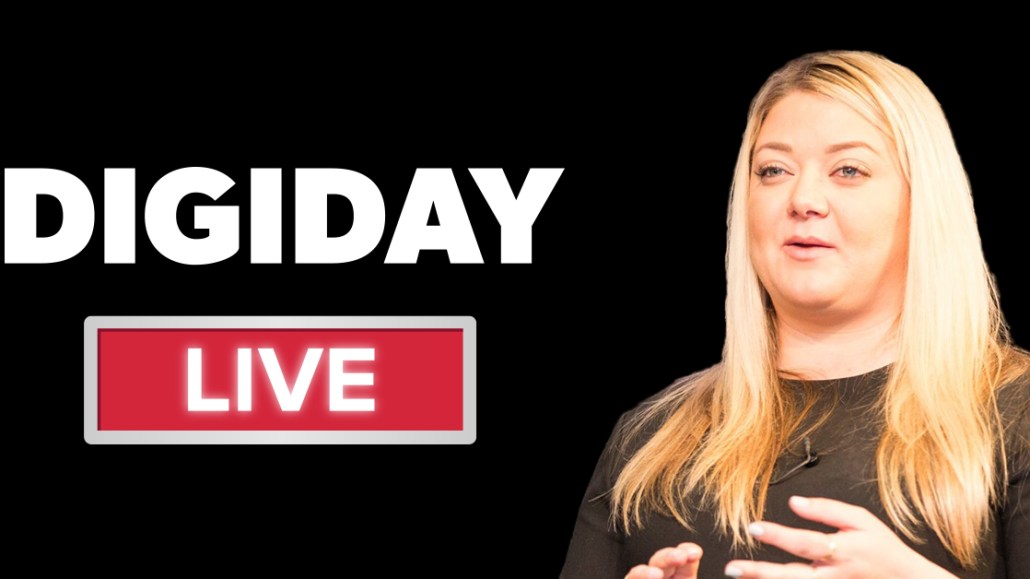Secure your place at the Digiday Publishing Summit in Vail, March 23-25
MailOnline’s Lauren Dick: ‘Facebook has a massive opportunity in header bidding’

Subscribe: iTunes | Stitcher | RSS
The MailOnline, the digital side of The Daily Mail, has used Facebook’s header-bidding product for the past six months. While it is happy with the results so far, Lauren Dick, head of emerging platforms at MailOnline, says Facebook could extend the product across all platforms.
“Facebook could have a real advantage if they can come up with something potentially more transparent than Google,” Dick said. “Header bidding has definitely given more control, but still, it’s limited to browser, so there’s still a huge opportunity to see what it looks like across all of our inventory.”
The product is only available on browser and not in apps, which make up 80 percent of MailOnline’s mobile pageviews.
Dick joined us at Digiday’s Programmatic Summit in Wicklow, Ireland, to discuss MailOnline’s experience so far with header bidding on Facebook and the challenges in its expansion in vertical video.
Edited highlights appear below.
Facebook’s header-bidding product has produced results
“We’ve seen two to three times the yield, far more access to the audience network demand, which is great. It’s quite limited data in the sense that it’s only across mobile web and in certain formats. It’s about what the next step looks like. Because while mobile web for us is huge in volume, there’s still huge opportunity around app and tapping into video, and extending that elsewhere.”
Header bidding needs to be a more seamless process in apps
“It’s a clunkier process to do any integrations in the app space. You’re looking at individual SDKs [software development kits] or mutual partners that you want to plug in, rather than everything more joined up, tag-based or even a single wrapper solution with several headers integrated within that. That’s simpler to set up on any browser, mobile or desktop. Right now, we have to be a bit more specific about who is going into the app.”
Facebook can have many advantages over Google
“Facebook has a massive opportunity in header bidding. There are certain limitations to the existing setups. And everyone has voiced concerns over Google’s monopoly. So Facebook has opportunity to work with more partners. Could they come up with something more transparent, that plugs in more partners, reduces the potential of Google prioritizing Google over everyone else.”
Expanding into video has many challenges
“From an editorial perspective, they are certainly thinking about how we can use more video throughout all of our articles — that’s the ambition. But we’re also thinking about how we can make more commercial content. It’s all about how we can make more monetizeable video, how we can create more content and do more video. We want to do everything, but it’s hard to know what the priority should be.”
Page latency is an issue across the board
“Header bidding hasn’t been that silver bullet for the industry. We have done things like looking at lazy loading, caching the first bit of the article and the first few of the images so we can push out a bit of that latency. We’ve not just looked at the ad side, but also from the editorial perspective because we have very heavy pages with images and video.”
Amazon is an untapped resource
“With Amazon, the big thing is the data and what that could look like. While it’s also true of Google and Facebook, Amazon is that really untapped retail spends data. So for me, when you work with Amazon, it’s more about how you layer the extra parts of Amazon back into the tech you’re working with.”
More in Media

The case for and against publisher content marketplaces
The debate isn’t whether publishers want marketplaces. It’s whether the economics support them.

Urban Outfitters shifts its influencer strategy from reach to participation
Me@UO is Urban Outfitters’ new creator program leverage micro-creators with smaller, engaged communities that are passionate about the brand.

Media Briefing: Without transparency, publishers can’t tell if Google’s Preferred Sources feature benefits them
Six months in, Google’s Preferred Sources promises loyalty-driven visibility, but leaves publishers guessing at the traffic impact.








